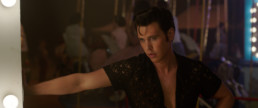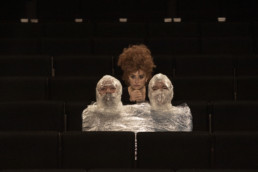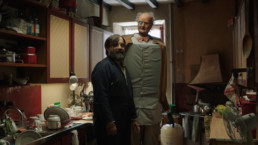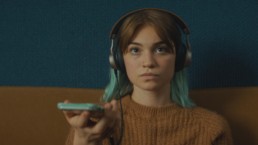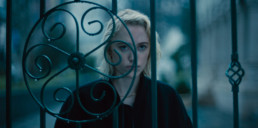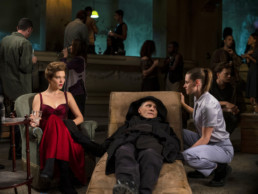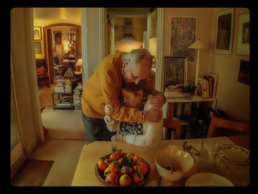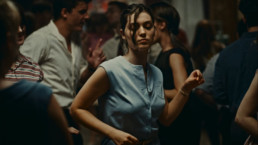'Elvis': Baz Luhrmann's Wildly Operatic Bio Pic Is Fit For A King
Where to watch: 'Elvis' is now playing in theaters nationwide.
The biggest thought I had while leaving the building after watching Elvis was, "Boy... that was a lot." Director Baz Luhrmann (Moulin Rouge!) succeeds in bringing the King of Rock and Roll's outlandish life story to the big screen in the most oversized, music-filled way imaginable. And yet, after being visually overloaded with this hyper-real staging of the rise-and-fall of Elvis Aaron Presley over 159 minutes, I also felt an unexpected solemnity. Surprisingly, an emotional connection had been forged with the man who, in real life, died a parody of his former self, but who in this sensationally operatic version of a bio-pic remix is given new life in his depiction as a lonely but culture-changing star.
With its high-flying camerawork and neck-snappingly quick editing, it's clear from the start that Elvis doesn't intend to play by the same rules that have kept other recent rock icon bio pics earth-bound. Baz Luhrmann–the unapologetically showy maximalist that he is–very much puts his visual stamp and spin on things here, even to the extent that, on the whole, the film largely overpowers the iconic entertainer's own star power. But it's this free-wheeling, unrestrained spirit that makes for a wholly unique viewing experience and tells Elvis's story in a fresh and exciting new way.
Beyond Elvis's singular style, the other key device that makes the film more than a traditional bio pic is the story that Luhrmann and Jeremy Doner choose to tell here (both also share screenplay credit with Sam Bromell and Craig Pearce). Elvis is not just the story of the Memphis-born singer only, but also that of his lifelong manipulative manager, Colonel Tom Parker, who many believe was largely responsible for not only Elvis's fall from grace, but even his premature death. A slippery snake oil salesman whose backstory is as unbelievable as his self-given suffix, "The Colonel" is here payed by Tom Hanks (whose combination of prosthetics and ambiguously European accent result in something between Cristoph Waltz and Foghorn Leghorn).
The Colonel's gleefully mischievous narration that opens the film and pops up throughout feels like a dark wizard ominously stirring a cauldron. We see that Elvis's story starts where The Colonel's begins: as a traveling circus leader promoting circus freaks and country singers through rural Americana. Always looking for the next attraction, he nearly dismisses a new Blues artist singing "That's All Right" on a nearby record player, until he learns with amazement: "He's whiiiite?" The potential opportunity for commercial success is instantly sparked, leading to chasing down his new fixation. After seeing young Elvis's (Austin Butler) power of possession to entrance the youth through his electrically arresting hip-shaking gyrations (which comically recalls 2001's early ape howls of new self-consciousness), he dangles a career to him like an evil genie. Young and naive and fueled by his love of music, Elvis agrees to The Colonel's proposal, and it's off to a future and relationship that would change the world.
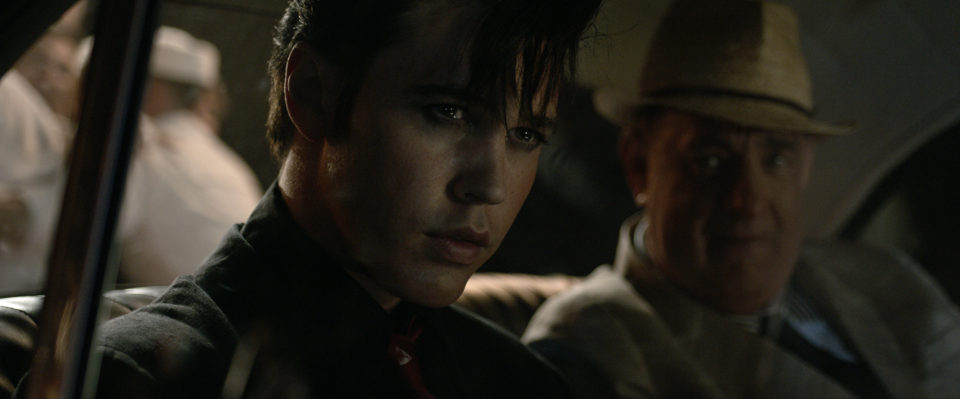
Elvis is definitely at its weakest when it feels obligated to play out the Greatest Hits moments of his life. Definitely narratively overstuffed, it's tough for the film to build any real sense of varying levels of drama, making every scene "the most" of what it can be. The other big swing that the film unfortunately misses is its attempt to link The Colonel and Elvis's stories of self-made creation together in similar fashion (a thematic through-line that also runs through Baz's remake of The Great Gatsby). "You and I are the same, my dear boy," The Colonel reminds Elvis and the audience throughout the film, which furthers the plot more so than any real emotional stakes.
Elvis is at its best and most captivating when it's not narratively bound. Baz Luhrmann's canvas is not one of realism, but expressionism. When the film wishes show how it might have felt experiencing Elvis's stardom at the time, it's electric. Going all the way back to seeing a Young Elvis (Chaydon Jay) wander into a Gospel-bumping tent and becoming possessed by the sweat-filled claps and shakes from the African American community, is heart-pounding. Hearing the distortion-laced electric guitar solo that accompanies Elvis's first dance moves, is gripping. And living through Elvis's final years, playing out a Vegas residency that would become his elephant's graveyard, is heartbreaking to watch him shut away in that hotel.
Austin Butler as Elvis is not just good. He very well might have been born to play Elvis in a big screen movie. What's beyond impressive–besides the fact that Butler is able to talk, sing, and dance like the singer–is that he impersonates the entertainer impeccably at every stage of his life; from early break through, to middling mid-career, to sweat-faced final act. His mannerisms are perfect, and perfect for each stage, turning in a performance that's nothing short of passionate, committed, and phenomenal.
Now, Elvis is not perfect. The movie is certainly superficial and surface-level, and it really isn't designed to create nuanced drama. Its first act is wonderful, but when the movie down shifts into its second and third acts, the story loses just a bit of momentum. But Elvis tells the story of an American icon in such a way that gives the man newfound respect, coloring him as a person whose past was more tragic than we knew. By the time the film approaches its finale–the chips of his life in pill-popping disarray–we're met with one of the most arresting musical sequences in the form of a rendition ofUnchained Melody that blends fiction and reality marvelously. During his final public performance, and underneath all the glitz and grandeur, we hear and feel the presence of a young singer who might have only ever wanted to be free.
'Official Competition' Parodies Actors, Artists, And Their Egos
Where to watch: 'Official Competition' is now playing in select theaters.
By nature, artists can lean towards being pretentious types. Their manic methods and peculiar processes can be so full of inflated pomp that they lend themselves quite easily to mockery. It's these types of characters that the new film Official Competition playfully pokes fun at, parodying the self-made drama that arises when artists and their competitive egos collide.
A Spanish film with English subtitles, Official Competition is a movie about making a movie. While most great show biz satires tend to mine comedy from comically disastrous on-set events that occur during filmmaking, here, the comedy is all taken from pre-production. Table reads, acting exercises, and ongoing talent demands get center stage spotlight. Not only are all of these moments played out with hilariously observed detail, they're also quite fun to see played out, as we can probably assume it mirrors the real process with A-list actors closer than we know.
Official Competition is aware of all of the egos involved in filmmaking, starting from the top: the financier. Here, that's somber billionaire Humberto Suárez (José Luis Gómez), who, after questioning his grand empire and legacy (looking out his high-rise skyscraper's large window–because, how else would you do so?) decides to make a movie to be remembered by. It doesn't matter that he hasn't read the novel that he's paid a fortune to adapt; that's for eccentric director Lola Cuevas (Penélope Cruz) to figure out, whose constantly lit clove cigarettes and tuft of comically wild red hair mirrors her own wild artistic spirit and uncompromising vision.
For the film at the center of it all–Rivalidad (Rivalry, in English), about two competing brothers–Cuevas casts two accomplished actors of equal acclaim and talent, but whose approaches could not be more opposite. The role of wiser older brother "Pedro" is to be played by Iván Torres (Oscar Martínez), a theater actor and acting teacher who's more studied, intellectually composed. A-list popcorn actor Félix Rivero (Antonio Banderas) is to play the self-destructive younger brother "Manuel,"is cast. Suffice it to say, the actors and their methods differ wildly, which the film has great fun with. Especially when Lola introduces her own wild ways of rehearsing for the film.
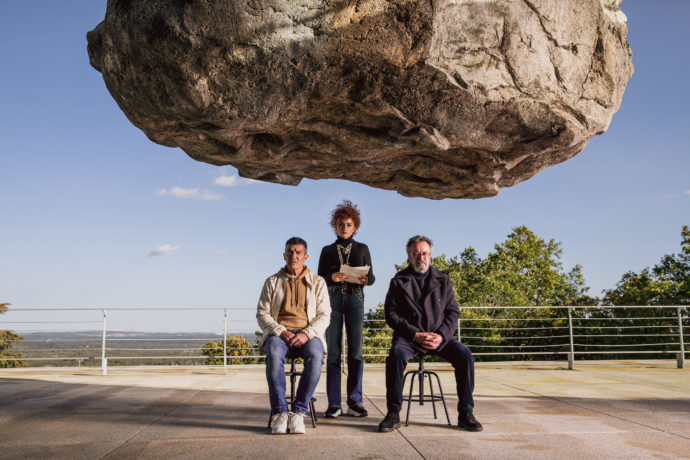
The film consists mostly of escalating sketches between these three comically insufferable artists. They are constantly topping each other with their obnoxiousness (but importantly, unconsciously so). It's a hilarious three-hander between Cruz, Banderas, and Martínez, who all perfectly cast and exceptionally hilarious here. While Martínez the actual actor was a revelation to me–his composed, intellectual performance being finely constructed–it really is Cruz and Banderas who steal the show here, who have never been funnier. Cruz's manic, laser-eyed drive towards exacting her vision is a new turn for the actor, and Banderas as the hunky, dopey celebrity knows how to get the most laughs from his big dumb bravado. Seeing them all together in stripped-down, intimate scenes between just one, two, or three of them makes for an intimate and fun watch.
Directed by Mariano Cohn and Gastón Duprat (who wrote the script along with Andrés Duprat), Official Competition uses its inflated pretension to hilarious effect. The comedy is captured with an absurdly sophisticated self-seriousness, making the entire world obnoxiously laughable. Specifically, I was reminded of the tone in Ruben Östlund's art world satire The Square. Further, the elaborate props and stagings throughout–whether a hilarious surplus of microphones to capture a rather steamy audio test, or a boulder hanging by a crane for an acting exercise–make for great scenes and visual comedy.
Surprisingly, Official Competition is even more than just a silly, one-note send up of show biz. Really, the story touches on the hypocrisy in human behavior, and the inherent conflict that arises in how we may wish to be, and how our more basic, impulsive, egotistically-driven selves stunt that. The film shows that all three actors are secretly yearning for the thing they pretend to be above (validation, commercial success, relevancy on TikTok), and a few lines on art gave me pause in thinking how prescient they are.
Once I was attuned to the film's comic style (which is accomplished in the opening scene), I was all-in. I was either smiling or laughing out loud watching the whole way through (save for an ending that's designed to disrupt the fun). For my money, so far, Official Competition is the funniest film of the year. It's a pitch-perfect comedy with smart writing and direction and some of my new favorite performances from some of film's best talents. This film is a true winner. Not that it's a competition, or anything.
1h 54min. Distributed by IFC Films. 'Official Competition' is rated R for language and some nudity.
In 'Brian and Charles,' An Eccentric Inventor Makes a Charming Friend
Our ‘Brian and Charles’ review was first published as part of our Sundance Film Festival 2022 coverage.
Where to watch: In theaters this Friday, June 17, 2022.
As you may be able to guess based on its simple, humble title, Brian and Charles is a modestly made, pleasant little movie. Its only desire is to charm and delight audiences with its bumbling but lovable characters and its sweetly conceived–if overly conventional–story.
Written by David Earl and Chris Hayward, the pair also stars as the film's titular pals. Brian (David Earl) is a big, bearded and bespectacled, and all-around quirky guy. He's clearly an odd duck, living by himself outside of town in a cottage that's filled with clunky junk and bric-a-brac everywhere.
But Brian's a positive lad, grinning from ear to ear with an upbeat demeanor as he proudly displays his highly impractical self-made contraptions. He's able to quite literally show off his inventions to "us," as the film uses a mockumentary filmmaking style similar to Ricky Gervais' The Office or Taika Waititi's Flight of the Concords, which adds a lighthearted levity to the film.
While dumpster diving one day, Brian finds a dummy head amongst the mountains of trash and waste. Staring back at its lifeless face, he mutters to himself, "Why haven't I thought of that before?" Apparently, building himself a robot buddy–although he's lived an otherwise lonely life–has never crossed his mind, until now.
He takes it back home and begins building the rest of his body, making himself a new friend. It's not until the morning after a lightning-fueled storm that Brian is surprised to find his new creation alive and looking back at him.
Imagine the funny version of Frankenstein and his creation, and you've pretty much got the set-up of Brian and Charles. Comically disproportional, the robot–who they both agree to name "Charles" (Hayward)–towers over the already-tall Brian. His awkwardly boxy washing machine for a body makes him goofily imbalanced, but his old scholarly look makes him look dignified (a comic balance).
Brian and Charles's friendship immediately blossoms. Brian teaches Charles new words from the dictionary, and the two enjoy the simple pleasures of dancing to pop music in the kitchen. You're likely going to love this movie if your idea of funny is a guy who's clearly in a robot costume dancing poorly and constantly repeating the word "cabbage" to draw laughs.
The new buddies continue having their fun, including Brian's equally awkward friend Hazel (Louise Brealey), with who Brian begins connecting closer. But you can probably guess the hurdles that are to come. The more Charles learns, the more he desires to see the world (Honolulu particularly, even going so far as to make his own Hawaiian skirt).
Brian, having only wished to build himself a companion to accommodate his comfortably sedentary lifestyle, shuts down Charles's every request to leave the house to explore all of life's adventures. Brian fears for how the outside world would react to Charles, either with disgust or desire to take him. But his protectiveness is beyond the concern of an overly-protective parent and is clearly a fear from his own lack of social comfort (a point I wish the movie developed further here).
The threat of the town bullies–Eddie (Jamie Michie) and twin daughters (Lowri and Mari Izzard)–is the biggest obstacle for Charles. It's up to Brian to help his new friend steer clear of danger, if they can keep their friendship together first.
As Brian, David Earl is a dopey but good-hearted and endearing guy (picture Michael Scott and Hodor). As Charles, well... Chris Hayward is mostly trapped in a clunky robot costume; but the two together have an undeniable chemistry that's perhaps even more impressive when you consider one of them can hardly see or move around, and they're able to create this connection.
While I wasn't overly stunned with any part of the film, Brian and Charles is still a delightful film that will likely entertain you. And, isn't that what friends are for?
90 min.
'Poser': Obsessive Hipster Thriller Set In the Underground Music Scene
Our ‘Poser’ review was first published as part of our Tribeca Film Festival 2021 coverage.
Where to watch: Only in Theaters This Friday at the Quad Cinema in New York and the Landmark Westwood in Los Angeles.
At a time when people define themselves through their highly curated appearances, personal styles, and tastes in things, creating an identity is easier to do than even before. But the feeling of "fitting in" is still much tougher. And when people turn to merely adopting others' personalities in the hopes of fitting in, when desperation grows, sometimes it can take a dark turn.
Premiering at Tribeca Film Festival, Poser explores the idea of identity and authenticity and the hopes of fitting in within the Columbus indie music scene (which the film actually takes place in, using real artists and bands to create the world). It's a captivating place to set the film in, being a place where art and expression is so creative and unique, along with it cool hipsters that make it up.
It's these cool hipsters within this underground music scene that captivates Lennon (newcomer Sylvie Mix), a quiet indie music fan who attends basement and warehouse shows with wide-eyed admiration for these artists. Hiding behind her chunky headphones and heavy backpack, Lennon uses her podcast as a way to meet these artists and enter their lives, capturing their conversations and original thoughts in catalogues of cassettes that she obsessively collects.
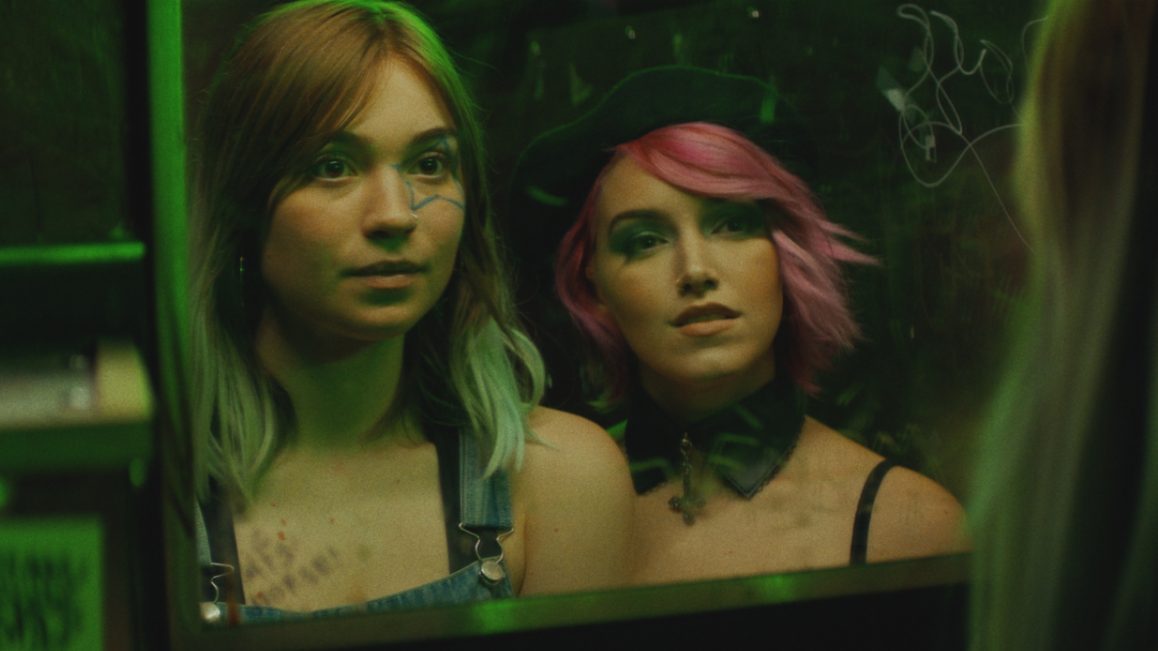
One such artist who Lennon befriends is Bobbi Kitten, singer of the indie pop duo Damn The Witch Siren (who plays a version of her actual self), and a friendship blooms between the two. As Lennon grows more comfortable around Bobbi and her new artist friends–who all continue to inspire her with their original thoughts and art, which she secretly records along the way–she also starts sharing her "original" writing and songs with the hopes of furthering her own art. That is, until it's revealed that Lennon's work might not be as original as she claimed to be.
A feature film debut from directors Ori Segev and Noah Dixon, Poser feels like a unique hybrid of Ingrid Goes West for the indie music scene. The duo of directors create a sense of thriller elements and suspense around the concept of someone who fakes their past in order to fit in. Newcomer Sylvie Mix in the lead role as Lennon, with her quiet yet captivating performance, is transfixing, and her presence in the movie feels like a true discovery.
To that end of "discovery," perhaps the coolest thing about Poser is that Segev and Dixon know Columbus' underground music scene so well, and feature real bands and music throughout the film. By intercutting a wide variety of these real artists and bands throughout the story and seeing their live performances, Poser feels even more real and makes for a fun sense of music discovery that indie and underground music fans will totally enjoy.
Poser ends up taking on some psychological thriller elements that made me think of Nightcrawler, though it doesn't quite go to the same dark depths that I hoped for. The ultimate world that it creates though, and it's introduction to this whole new impressive group of talented filmmakers, actors and musicians is enough for me to recommend this film to all of my hip and tastemaker friends.
87 min. Distributed by Oscilloscope Laboratories.
https://www.youtube.com/watch?v=YfwqoSaSlVY
In 'Watcher,' Maika Monroe Grows Paranoid From a Possible Stalker
Where to watch: 'Watcher' is now playing in select theaters.
Psychological thrillers are such an unsettling genre. We as the audience are forced to question who to trust and what we believe to be real. Unfortunately, this is also very similar to parts of the female experience.
Whether it's from high-profile lawsuits or in daily life, women's truths and experiences remain at the mercy of largely male-dominated cultures that are able to validate or reject so fleetingly. This unbalanced power dynamic is what makes the new psychological thriller Watcher compelling for these times.
Watcher follows Julia (Maika Monroe), a young woman who relocates with her partner Francis (Karl Glusman) to Romania following his job promotion. Currently unemployed and unable to speak the local language, Julia spends her days alone, people-watching through her apartment's large inviting windows.
Things start off well enough. Julia goes to a local coffee shop and attempts to chat with the waiter with her limited Romanian knowledge (and fails). Her feelings of loneliness soon turn into deeper unease as one night, on a walk home with Francis, they pass by a crime scene where a woman has been murdered. She then learns on the news, that the victim–the latest of four young women, all around her age–has been horrifically murdered by a serial killer.
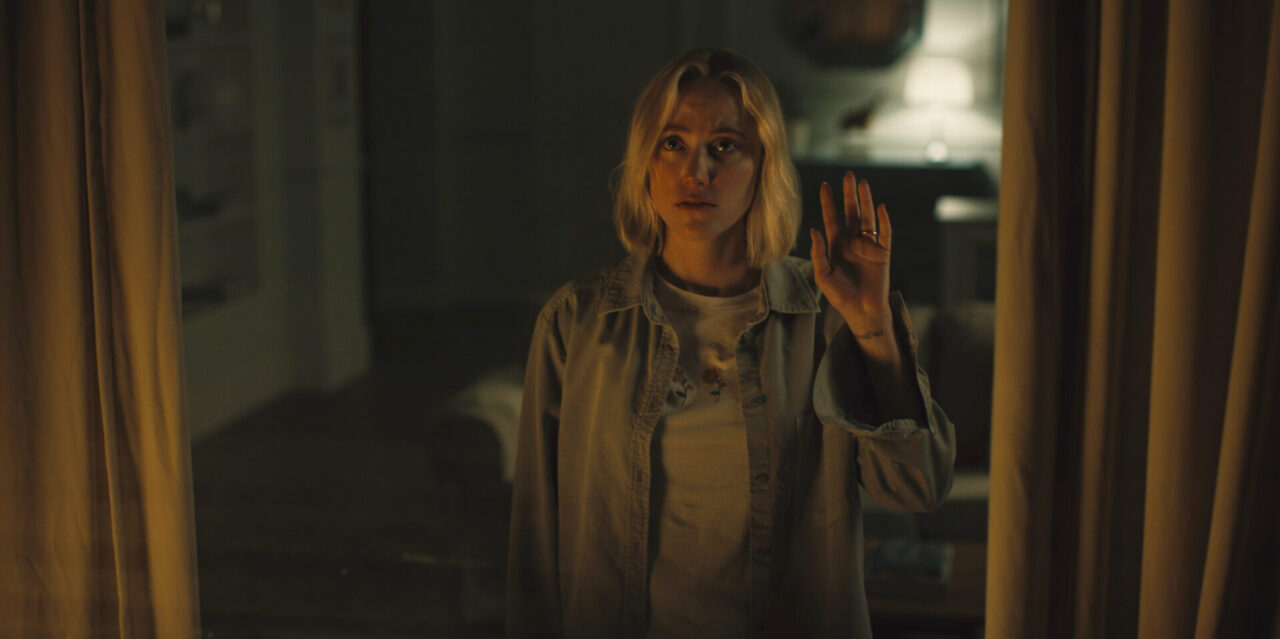
Continuing to spend her days alone (Francis's job keeps him out late a night), Julia's fears only continue to grow. Her public outings become panic-stricken, with one creepy person (Burn Gorman) growing more unsettling; is he following her into the movie theater, and into the grocery store? When she identifies him to Francis as well as the police–without any proof of his wrongdoing–they are left to ask if he following her, or if she herself is obsessing over him? "Maybe he's staring at the woman who's staring at him," Francis reasons, leaving Julia to wonder whether her experience is founded on delusion or real danger.
Written for the screen and directed by Chloe Okuno (in her directorial debut), Watcher follows a classic psychology thriller setup. Its paranoia vibes are undoubtedly Hitchcockian (any time a person voyeuristically watches through a window will draw Rear Window references). But Watcher also has the modern-day social commentary nod of Alex Garland's Men. By putting Julia at the center of this story, Okuno gives this psychological thriller a smart and modern feminist twist.
And yet, while all of these elements are great, Watcher ultimately doesn't build with suspense and dread the way I hoped it would. In part, Julia's character is too under-written. While Maika Monroe conveys the same captivating wide-eyed worry that put her on the map in It Follows, Julia's character remains a little too internally repressed after going through so much mental torment. When she admits halfway through that, "I feel like I'm losing my mind," it feels like just a line delivery rather than something fully earned. Watcher would hit differently if her mental unraveling was closer to, say, Shelley Duvall's in The Shining (perhaps a poor example, as it's widely known that Kubrick put the actress through great psychological anguish to help achieve the performance).
Ultimately, what's most compelling about Watcher is its feminist lensing that equates "being watched" to being victimized. To be "watched" is to be left passive and helpless. And it's what Julia is left to do, by her alleged stalker, her partner, and the police. But when she follows her obsession and becomes the "watcher" herself–going so far as to put herself in danger, in a very bloody and grisly end–she also takes back her power. To be a woman, or to live the female experience, means that owning your truth is something you'll always have to look out for.
1h 31m. 'Watcher' is rated R for some bloody violence, language, and some sexual material/nudity.
https://www.youtube.com/watch?v=KDc6ZLo8sjc
'Crimes of the Future' Pokes Fun and Probes Deep
The new film by David Cronenberg, Crimes of the Future, cuts deep: both figuratively and literally. Figuratively, by way of the many philosophically penetrating questions that the writer-director poses. Literally, with the numerous open chest surgeries that are displayed in the film. In Cronenberg's world, where else would you look for the answers to where humanity is headed than inside our very selves?
Crimes of the Future is, indeed, set in the future. One in which humans evolved past the point of feeling any physical pain. Some even live off of plastic. With such biological advancements, it's become vogue to experiment with bodies. Physical mutilation is akin to avant-garde art. As its cosmopolitan crowd believes, "Surgery is the new sex."
Celebrity performance artist Saul Tenser (Viggo Mortensen) and his partner, Caprice (Léa Seydoux) are at the center of this new art world. What's special about Tenser–and why he's beloved by the art world–is that he's evolved past the rest of humanity. Tenser's able to grow new organs. For their renowned performances, Caprice remotely controls the blades that slice and dice him up, and raises his organs overhead like magic acts, to rapturous applause. The performances take their toll on him, though. The cough-addled and wheezing Tenser is constantly sustained by Cronenbergian humanoid tubes to re-nourish his fragile body.

It's clearly a wild premise. Those who are familiar with Cronenberg and his singular brand of body horror know that he grounds the grotesque within a very satirical setting, so as to make the whole thing more palatable. Here, the ridiculous pomp of the art world and their laughable collective comic awe offsets the very stark display of public surgeries. The adoring public constantly stops Tenser, who slunks into rooms like Kylo Ren, probing him for details about his "new work," and his "next show." Kristen Stewart also gets in on the fun here. She provides a faint joy as a national organ registrar, whose professional duties give way once she becomes similarly enraptured by Tenser and his charismatic effect.
The tongue-in-cheek comedy is quite clear. However, Crimes of the Future moves into even darker ground. A mysterious person's (Scott Speedman) arrival also brings to light the existence of a young boy, whose unique biological makeup is similar to that of Tenser's. These highly evolved people–with "accelerated evolution syndrome"–are actually in more danger than they realize. If you can feel no pain and live off of plastic alone, are you even "human" at all? And what steps would society take to keep them from taking over? In the film's most unsettling scene, Tenser and Caprice put the young boy at the center of their surgical show (a scene that prompted multiple walkouts at Cannes).
If you haven't seen any films by David Cronenberg before, Crimes of the Future is certainly an interesting place to start. It's his first return to the body horror genre in a long time. You'll quickly see the director's trademarks: human organs, the fringe groups that must overcome conspiracy theories (here, called "The Cause"), and a controlling presence.
For those who are familiar with Cronenberg's films, Crimes of the Future is a fun reminder of what's made him so beloved. While the film poses interesting questions, it’s not his finest work. His tools are at their most blunt and obvious when he so deliberately forces the questions of art, celebrity, pain, and what the future holds. But subtlety isn't his thing. Cronenberg does continue to master the sci-fi genre, using it to frame questions that we all should be asking. He just chooses to use a scalpel that's a little showier.
1h 47m. 'Crimes of the Future' is rated R for strong disturbing violent content and grisly images, graphic nudity, and some language.
https://www.youtube.com/watch?v=v_bbLcJAHEo
'Vortex' Meditates on Dementia and Dreams
The thought of eventually dying is scary. It's an entirely unpleasant thing to ponder (especially given how tragically it might happen, as recent headlines in this country continue to illustrate). And yet, what I'd reason is just as scary, is living long enough to the point when our minds stop working before our bodies do. To shuffle through the last years of your life–trapped, helpless, and without the comfort of self-control–would be a terrible suffering to have to endure.
The idea of control–or more specifically, the helpless feeling of not having it–is something that consumes the mind of writer-director-provocateur, Gaspar Noé. Whether he's interested in the loss of control of our bodies (Irreversible), our minds (Enter the Void, Climax), or romantic partners (Love), his films are intent on presenting suffering in its starkest, bleakest of forms. And we, as the audience, must endure this too as a type of pain-based stamina test, a demented joy ride one is forced to take to see if there's any light at the end of the tunnel. Is there any grander meaning to it after living through such cruel nightmares?
While Noé is well known for being deliberately demented in his pop-shock presentations (seizure-inducing strobe lights are a signature), his latest film–Vortex–is perhaps his most unexpected yet. While it fits within his body of work, Vortex meditates on suffering by telling the story of a dementia-stricken couple living out the final days of their life together. While you won't find any hints of gleefully-deranged hallucinogenic dance parties in this somber, sober, and incredibly moving film, it remains impactful.
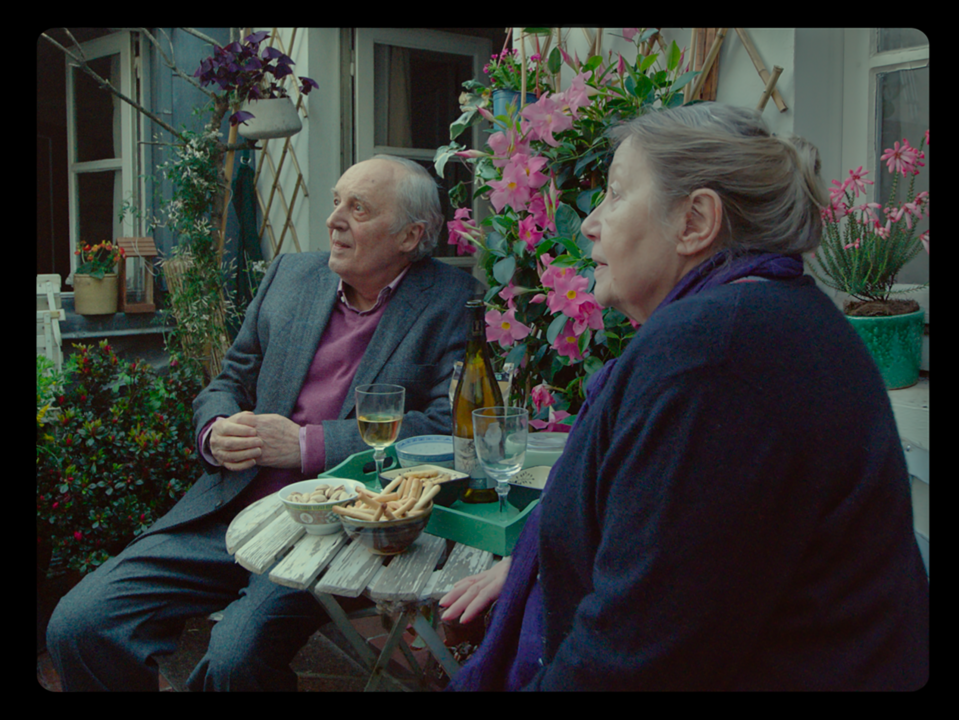
In Vortex, we follow an elderly couple living in a cramped French apartment. Sharing a single frame together (an important note for now), they venture to share a meal on the balcony. Elle (Françoise Lebrun) asks him, "Life is a dream, isn't it?" To which Lui (Dario Argento) agrees: "A dream within a dream." And then, this painful dream begins.
We next see them in bed from a bird's eye view. Elle awakes in a sort of silent early morning panic. Heartbreakingly, the frame divides them both into their own frames–to which they will remain throughout the rest of the film. In a visually experimental move, Noé presents the rest of the film in split-screen narrative. We must follow Lui and Elle's lives, played out in real-time sequences lasting for impressively long stretches, from within their isolated frames.
We soon see the early stages of Elle's dementia. Taking out the trash becomes an impromptu trip into a street shop. As we see her wander through the streets, all with a look that conveys vacancy and innocence, Lui continues readying himself for the day, unaware of her whereabouts. When he finally realizes she's gone and finds her, he confronts her with concerned interrogation, her blank face unable to provide answers. As her condition worsens, he remains steadfast in his devotion to her. Or is it that he doesn't wish to acknowledge this new reality–this dream within a dream? This becomes their shared downfall.
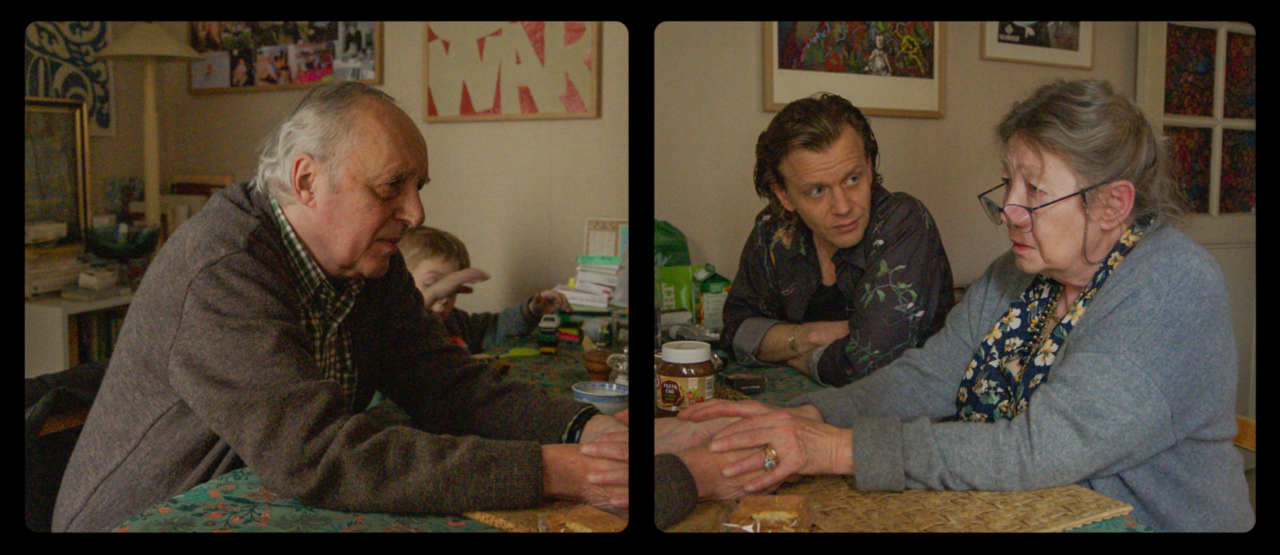
At 2 hours and 22 minutes, Vortex is a gripping watch. The longer the story heightens with suspense, the more I was racked with urgency. The film would not succeed without its brilliant actors who inhabit every second of the film, delivering some of the most naturalistic performances. I'm still in awe as I write and think back about how Lebrun, as Elle, is able to convey this specific mind state, with that blank but warm stare on her face. And Argento (who cinephiles will recognize as the director of Suspiria) delivers as equally a realistic performance.
What I noticed about halfway though watching Vortex–with its split-screen narrative–was that I found myself watching Lui more. Why was that? Was I indirectly identifying with him, making him the central character of this story? As if Elle's wandering were only affecting his life? It was a moment where I consciously shifted my main viewing towards Elle's frame–making her the lead character–and, Lui being secondary. Ultimately, the cross-viewing nature only points out–as I believe Noé intends–that both are equally plagued with this disease. A commitment that's built on love, through sickness and in health, is a journey that both will have to take.
Sadly, we all recognize that aging and its ailments are a natural part of life. Some would be so lucky to live as long a life as to experience them. But the matter stands, that the inevitable decline of our bodies–these precious, fragile and temporary little vessels–will break down, leaving us physically trapped, helpless, and without control. In Vortex–as Noé shows–if we're lucky enough, it's a dream we might not have to dream alone.
2h 22m. Distributed by Utopia.
https://www.youtube.com/watch?v=-L-ZcCFePAs
'Happening' Is a Visceral, Vital Abortion Drama For Our Times
Happening tells a harrowing tale of a young girl's unplanned pregnancy, and the torturous journey she is forced to take when she is denied the choice to terminate. Winner of the Golden Lion at the Venice Film Festival (the festival's highest prize), Happening is one of the most powerful and certainly the most excruciating films that I watched at the Sundance Film Festival this year (and that's including two horror films).
An adaptation of Annie Ernaux's eponymous novel, Happening is the story of Anne (Anamaria Vartolomei), a naturally beautiful girl who's also clearly not interested in men's advances. She waves off their interest to dance on a night out with friends, who are all excited by the allure of male closeness. We see that Anne's real focus and gifts are in the classroom. Clearly bright with academic potential, Anne is passionate about her area of study: Literature and writing.
The film makes an interesting reveal when we see Anne–and not any of her flirtier friends–checking to see if she has gotten her period. "Still nothing," she scrawls onto a notepad. A title card flashes onscreen: "3 weeks." Apparently, she's been hiding something that we're not yet aware of.
At a doctor's appointment, we learn of both Anne's situation and the time in which this is all taking place: we're in 1960s France, a time when abortion is illegal. So when the doctor tells Anne that she's pregnant, she's shocked, and can't believe the news (nothing we've seen onscreen at this point has shown how this could be the case).
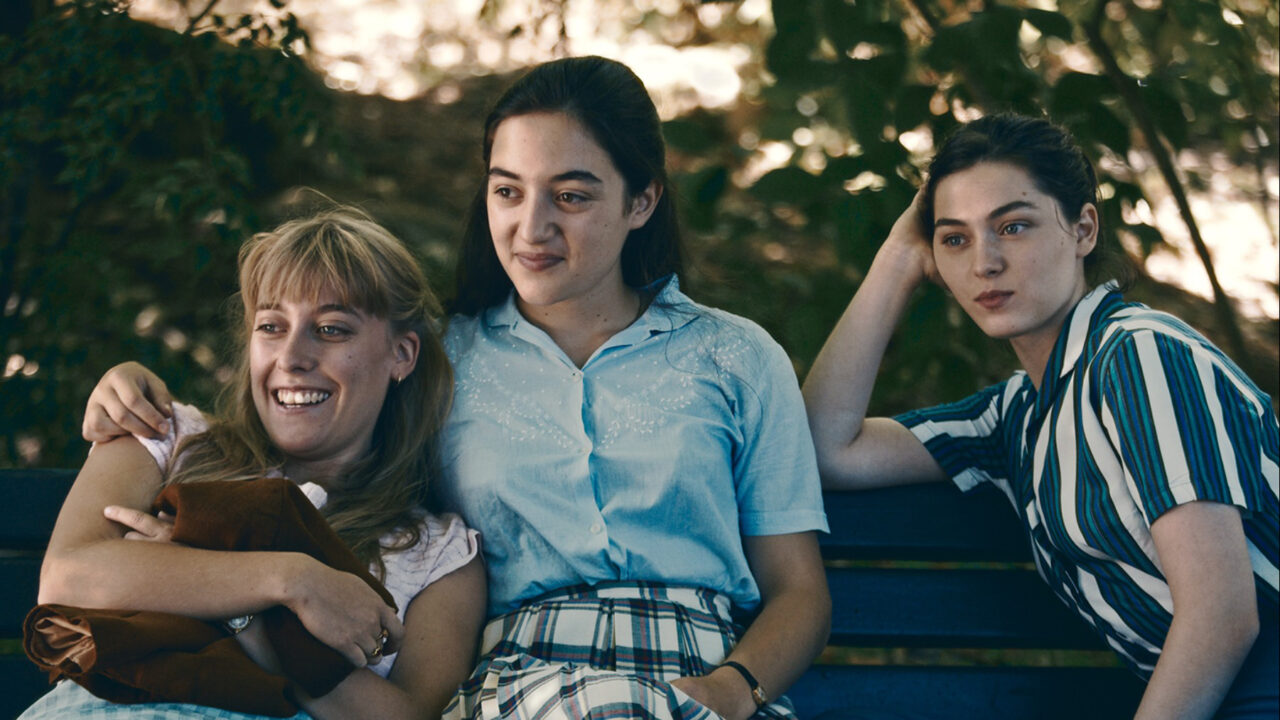
Beyond dashing her plans for taking exams to get into University, carrying the baby to term would determine the rest of her life as a struggling unwed mother. With more force than fear, she asks the doctor to take care of it. His furious look back at her with judgment in his eyes shows the larger culture's belief, that this is not a woman's choice. Anne's road ahead is about to be a very tough one and one she'll have to take alone; however illegal and dangerous.
The way the film tells its story and how it divulges information is very smart. Initially setting up Anne as the prudish outsider, only to show that she's actually the one with the deeper understanding of the world, is a powerful reveal. Happening also subverts expectations with how we learn that the subject of pregnancy is taboo altogether. The doctors, students at school, and even her friends meet the topic with discomfort and fear.
Bringing Anne's heartbreaking story to the screen is Anamaria Vartolomei, whose soft exterior transforms into a determined, hardened one. Her resolve grows after each attempt to terminate the pregnancy goes unsuccessful, with suspense growing as the title cards continue to arise (4 weeks, 5 weeks, 9 weeks...). As Anne's focus drifts from her studies and onto her more immediate time-sensitive urgencies, Anamaria brings unwavering conviction ("I'll manage," she says). It leads to a disturbingly depicted scene of Anne attempting to handle it herself, which had my hands gripping my face and watching through my fingers to make it through.
What's terrible is that even this attempt is not where her story ends. Director Audrey Diwan is so fearless in how she keeps us in Anne's point of view the entire time. The decision to shoot in 4:3 aspect ratio keeps Anne in the middle of the frame, speaking to how subtle yet impactful the cinematography by Laurent Tangy is. Anne can't escape this story, no matter how hard she tries.
It's wrenching to watch the film's breathtaking climax. And yet, this challenging finale is also why the film is so important. Beautifully lensed, strongly directed, and with a lead performance that is one of the bravest I've seen from a promising new actor, Happening tells a vital story that is sure to make a searing impression in your mind, and whose politics are still being fought for today.
100 min. Distributed by IFC Films. 'Happening' is rated R for disturbing material/images, sexual content and graphic nudity.

